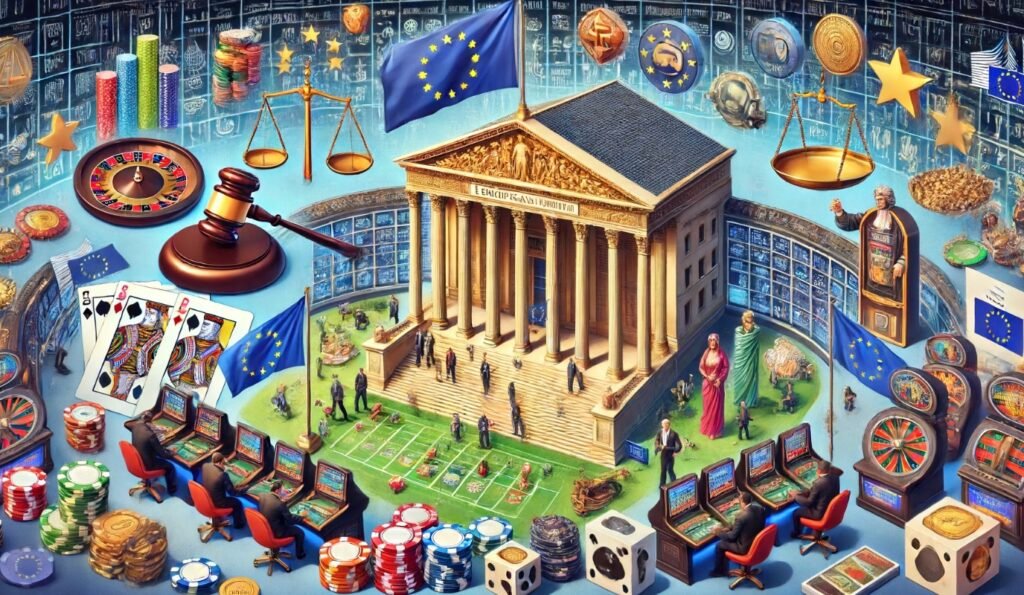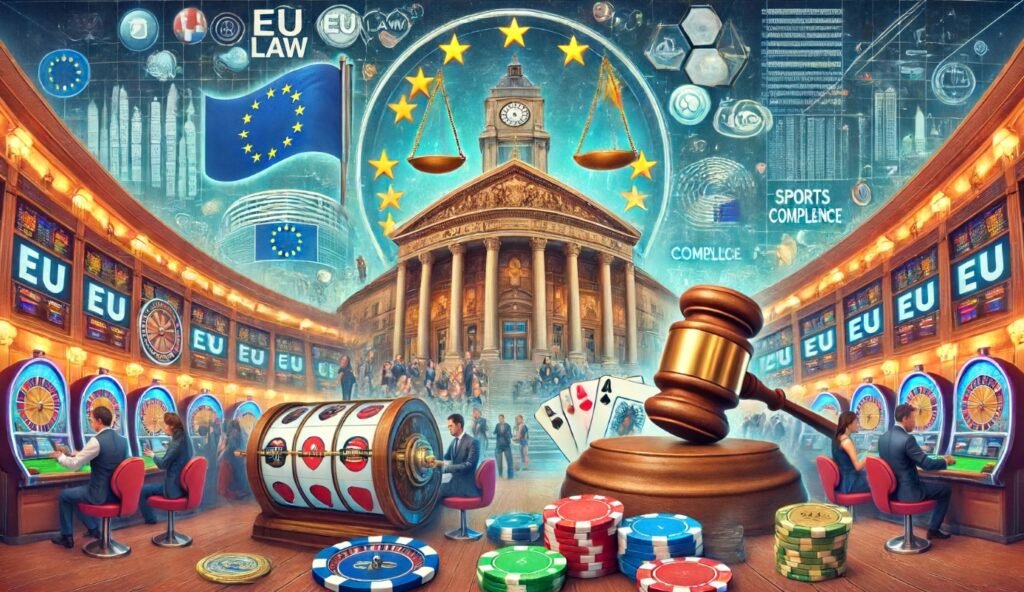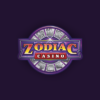Ensuring compliance with iGaming regulations is crucial for the smooth operation of your business within the European Union. However, before delving into the intricacies of these regulations, it’s essential to grasp the scope of activities encompassed by the term “iGaming.”
iGaming, also referred to as online gambling, comprises various forms of wagering conducted over the internet. This encompasses:
- Online casinos
- Sports betting
- Poker
- Lotteries
- Slots
This article aims to provide an overview of general aspects of online gambling laws, the EU’s approach to regulating online gambling, and the diverse regulatory frameworks implemented by individual countries. Additionally, we will include references to online resources for EU iGaming laws, ensuring access to the most current information available.
iGaming Regulations Across the EU in 2024
| Country | Regulations & Status |
| 🇦🇹 Austria | 🟥 Online casino gaming is largely monopolized, with limited options for private operators. |
| 🇧🇪 Belgium | ✅ Online gaming is legal, but operators must partner with existing land-based casinos. Strict licensing requirements. |
| 🇧🇬 Bulgaria | ✅ Online gambling is legal. There is no specific licensing system, but operators must obtain a license from another EU country. |
| 🇭🇷 Croatia | ✅ Legal and regulated, with licenses available for online casino operators. |
| 🇨🇾 Cyprus | 🟥 Online casino games are illegal, except for sports betting. |
| 🇨🇿 Czech Republic | ✅ Legal and regulated. Foreign operators need a local entity to obtain a license. |
| 🇩🇰 Denmark | ✅ Fully regulated market. Online gambling is legal with a licensing system in place. |
| 🇪🇪 Estonia | ✅ Legal and regulated. Operators require a license and must comply with local laws. |
| 🇫🇮 Finland | 🟨 Monopoly system. Only state-owned entities are allowed to offer gambling services. |
| 🇫🇷 France | 🟥 Online casinos are illegal, but sports betting and poker are legal. |
| 🇩🇪 Germany | 🟨 Online gambling is partially legal. Strict regulations and licensing requirements. |
| 🇬🇷 Greece | ✅ Legal and regulated, with licenses issued to both local and foreign operators. |
| 🇮🇪 Ireland | ✅ Online gambling is legal. No specific licensing system, but operators must obtain a license from another EU country. |
| 🇮🇹 Italy | ✅ Online gambling is legal and regulated. Operators must obtain a license from the Italian authorities. |
| 🇱🇻 Latvia | ✅ Legal and regulated. Operators need a license from the Latvian authorities. |
| 🇱🇹 Lithuania | ✅ Online gambling is legal with a licensing system. Strict regulations in place. |
| 🇱🇺 Luxembourg | 🟥 Online casino gaming is illegal. |
| 🇲🇹 Malta | ✅ A hub for online gaming. Legal and highly regulated. Malta Gaming Authority issues licenses. |
| 🇳🇱 Netherlands | ✅ Online gambling became legal and regulated in 2021. Licensing system for operators. |
| 🇵🇱 Poland | 🟨 State monopoly on certain gambling activities. Online gambling is partially legal with stringent regulations. |
| 🇵🇹 Portugal | ✅ Legal and regulated. License required from the Portuguese authorities. |
| 🇷🇴 Romania | ✅ Legal and regulated. Licensing system for operators. |
| 🇸🇰 Slovakia | ✅ Legal and regulated. Online casino licenses are available. |
| 🇸🇮 Slovenia | 🟥 Online gambling is largely illegal, with few exceptions. |
| 🇪🇸 Spain | ✅ Legal and regulated. Operators must obtain a license from Spanish authorities. |
| 🇸🇪 Sweden | ✅ Online gambling is legal and regulated. Licensing system in place. |
| 🇬🇧 United Kingdom | ✅ Highly regulated market. Legal with a comprehensive licensing system. |
Why Regulations Are Important
Understanding the ins and outs of iGaming can be intricate, particularly when it comes to regulations.
Within the EU, each country has its own set of laws and regulations governing iGaming. This diversity underscores the importance for both businesses and players to stay informed about these regulations. Regulations serve to safeguard players’ interests, promote fair gameplay, and uphold the integrity of the iGaming industry, albeit to varying degrees.

The EU’s Role in iGaming Regulations
While the EU plays a guiding role in shaping regulations, individual member states are responsible for regulating their own gambling industries.
This decentralized approach has resulted in a patchwork of regulations across the continent. It’s important to note that although there is no overarching EU-wide legislation for iGaming, the EU does exert influence through legal rulings and policy recommendations.
Country-Specific Regulations
Below is a table summarizing iGaming regulations in different EU countries along with links to official government pages providing detailed information:
| Country | What does it do? | Source |
| United Kingdom | The UK Gambling Commission regulates all forms of gambling. Online operators must have a license from the UKGC. | UK Gambling Commission |
| Germany | Germany has recently liberalized its iGaming laws, allowing online casinos and poker. Each state has its own regulations. | Germany State Treaty on Gambling |
| France | ARJEL regulates online gambling. Online casinos are prohibited, but online sports betting, poker, and horse racing are. | ARJEL |
| Italy | The AAMS regulates all forms of gambling in Italy. Online casinos, sports betting, and poker are allowed with a license. | AAMS |
| Spain | The DGOJ regulates online gambling. Online casinos, sports betting, and poker are allowed with a license. | DGOJ |
Kindly be advised that the information provided herein may be subject to updates. For the most current regulations, we recommend referring to the respective government websites.
Key Aspects of iGaming Regulations
Now that we’ve gained a foundational understanding of iGaming regulations across different EU nations, let’s explore some common features frequently incorporated in these regulations:
Age Restrictions
One of the fundamental components of iGaming regulations is the establishment of age limits.
Throughout the EU, the minimum legal age for participation in online gambling typically falls within the range of 18 to 21 years.
Age requirements serve as a widely embraced standard across the iGaming industry, ensuring responsible participation.
While specific age thresholds may vary from one country to another, the principle of age limitation remains consistent, not only within the EU but also on a global scale.
Age Verification Process
Ensuring the age of participants is a crucial requirement for iGaming operators. Typically, this verification occurs during the registration process, where users must provide documentation proving their age. This may involve submitting scanned copies of passports, licenses, or other government-issued identification documents.
Some operators may utilize third-party service providers to authenticate the information provided by users.
Consequences of Underage Gambling
Participating in gambling while underage carries severe repercussions for both individual players and operators. Underage players risk forfeiting their winnings, having their accounts terminated, and in some cases, facing legal consequences.
Operators found to have permitted underage gambling may face penalties, license revocation, and damage to their reputation.
Parental Controls
Many gambling websites offer parental control features to prevent underage access. These settings restrict access to gambling content, ensuring that minors cannot engage in gambling activities.
Licensing
Licensing is a cornerstone of iGaming regulation, providing a legal framework for operators to offer their services. It ensures the reliability of platforms and builds trust among players.
The Importance of Licensing
Licensing serves as a cornerstone in upholding the integrity and safety of the iGaming industry. Here are several key reasons why licensing is of utmost importance:
- Player Protection: A license signifies that an operator complies with regulations aimed at safeguarding players. This includes provisions for data protection, dispute resolution mechanisms, and ensuring fair gaming practices.
- Anti-Fraud Measures: Licensed operators are mandated to implement robust measures to combat fraudulent activities. This involves maintaining secure transaction systems and preventing money laundering schemes.
- Responsible Gambling: Licensing authorities enforce requirements for operators to promote responsible gambling practices. This may include implementing betting limits, offering self-exclusion tools, and providing resources for individuals with gambling-related issues.
Licensing Across the EU
Licensing regulations within the EU vary significantly from one country to another. Each nation has its own regulatory body responsible for issuing licenses and overseeing iGaming operations. Here are a few examples:
- United Kingdom: The UK Gambling Commission oversees iGaming licensing and regulation in the UK. Operators must meet stringent standards regarding fairness, transparency, and responsible gambling to obtain a license.
- Malta: The Malta Gaming Authority is globally recognized for its rigorous regulatory framework. It grants licenses to operators worldwide, emphasizing high standards of regulation and oversight.
- Sweden: The Swedish Gambling Authority, known as Spelinspektionen, is responsible for licensing iGaming operators in Sweden. Its primary objective is to ensure the legality, safety, and reliability of the Swedish gaming market.

Promoting Responsible Gambling
Responsible gambling practices form a crucial aspect of iGaming regulations. These encompass measures such as deposit limits, self-exclusion programs, and providing resources for individuals facing gambling-related issues.
Responsible gaming, synonymous with responsible gambling, encompasses a comprehensive set of policies and requirements aimed at ensuring the highest standards of quality and safety in the gambling industry. It aims to safeguard users from potential negative consequences associated with online gambling.
Given the inherent risks associated with gambling, regulatory frameworks are imperative to protect players and uphold responsible conduct among operators, software providers, and other industry stakeholders.
EU Approach to Responsible Gaming
The European Union’s governance system significantly influences the regulation of online gaming across its member states. While the EU lacks a unified law for gambling services, each member state retains autonomy in organizing its gambling offerings, provided they adhere to the fundamental freedoms outlined in the Treaty on the Functioning of the European Union (TFEU).
The types of online games permitted vary among EU countries, ranging from all-inclusive to restricted categories such as betting, poker, or casino games. Some jurisdictions operate monopolistic regimes, while others adopt licensing systems allowing multiple operators in the market. EU law remains neutral regarding the preferred regulatory approach.
The European Commission actively supports member states’ initiatives to modernize their national online gambling legal frameworks, prioritizing consumer protection and safeguarding vulnerable groups, including minors.
In pursuit of standardization, the European Commission has tasked the European Committee for Standardisation with developing a voluntary European standard on reporting to enhance the supervision of online gambling services by national regulatory authorities.
Resources for Responsible Gaming
A wealth of resources is available for those seeking to delve deeper into responsible iGaming. It’s essential to gain a comprehensive understanding of current regulations before embarking on any endeavors in the online casino or gambling sphere.
Here are some key links to explore:
- Gaming Regulators European Forum (GREF): GREF is an organization comprising representatives from gambling control authorities across Europe. Together, they collaborate to exchange information, share best practices, provide mutual support, and advocate for unified approaches to gambling regulation.
- International Association of Gaming Regulators (IAGR): IAGR is a global organization dedicated to enhancing the effectiveness and efficiency of gaming regulation worldwide. They offer a wide range of resources, best practices, and a platform for dialogue on gaming regulation issues.
- Information on Match-Fixing from the Council of Europe: Match-fixing poses a significant threat to the integrity of sports betting. The Council of Europe provides a valuable resource offering information on match-fixing, its ramifications, and the measures implemented to combat this issue.
Navigating iGaming Regulations: Player’s Perspective
As a player, it’s imperative to comprehend and adhere to the regulations governing the country in which you’re participating. Failure to do so could result in penalties, such as being barred from specific platforms. Always verify that the platform you’re using is licensed and compliant with the regulations of your region.
Navigating iGaming Regulations: Business’s Perspective
Understanding iGaming regulations is essential for business success, albeit complex. Adhering to these regulations fosters trust among players and can confer a competitive edge. Consider consulting legal experts to ensure full compliance with relevant regulations.
Below are some useful resources to aid in navigating the regulatory landscape:
- iGaming Affiliate Software: Essential tools for any iGaming enterprise, including Scaleo, Affilka, Traffic Manager, Smartico, and BetConstruct, among others.
- European Union (EU) Gambling Regulations: EU member states regulate online gambling independently under the Treaty on the Functioning of the European Union (TFEU). Most EU nations permit some forms of online gambling.
- European Commission and Online Gambling Services: The Commission supports member states’ endeavors to modernize their national online gambling frameworks and prioritizes consumer protection, particularly for vulnerable groups such as minors.
- Online Gambling Licensing in Europe: Europe’s online gambling sector is subject to stringent regulation. Companies often require multiple licenses, each with its unique compliance requirements, to operate and provide services in specific countries.
Conclusion
The regulatory landscape of gambling services within the European Union (EU) lacks specific legislation, granting member states autonomy in organizing their gambling offerings. However, adherence to the fundamental principles outlined in the Treaty on the Functioning of the European Union (TFEU), as interpreted by the Court of Justice of the European Union, is mandatory. This includes the freedom to establish or provide services across EU borders.
While some EU member states permit a range of online gaming activities, others restrict certain types such as betting, poker, or casino games. Some jurisdictions even maintain a monopoly over online gaming services, operated by either state-controlled entities or private operators with exclusive rights.
Nevertheless, several member states have adopted a more liberal approach, allowing multiple operators to offer gambling services, contingent upon the implementation of a regulated licensing system. Community law remains neutral, refraining from favoring any specific regulatory regime.
Understanding iGaming regulations across the EU can be challenging due to the inherent differences among member states. It requires careful consideration of these variations to navigate the diverse regulatory landscape effectively.





















